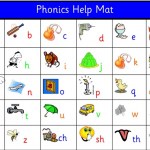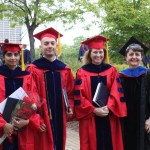education
“Quite frankly, teachers are the only profession that teach our children.” -Dan Quayle
It wasn't that long ago that I myself was a student, and of course over the past decade-and-a-half I've been very heavily involved in education -- both formally and informally -- at a huge variety of levels. And over time, education methods have not only changed, but they continue to change, not always necessarily for the better.
Image credit: Quality Primary Resources, via http://www.qualityprimaryresources.co.uk/Phonics-Table-help-mat.
Well, this week's Ask Ethan is all about one of the…
When Brian Castrucci sees signs up at local retailers offering discounts to police officers and firefighters, he thinks: Why not public health too?
“How do we better brand ourselves as those who protect and serve,” asks Castrucci, chief program and strategy officer at the de Beaumont Foundation, which supports a variety of projects aimed at strengthening the nation’s public health system. “I’ve never been a victim of crime, but I still value the police. I’ve never had a fire in my home, but I still value the fire department. …I want people to value prevention. I want people to know (public…
Yesterday's frat boy post prompted some interesting discussion, one piece of which is a response from Matt "Dean Dad" Reed (also at Inside Higher Ed), who overlapped with me at Williams for a year, but had a very different reaction to the social scene there. His take mirrors mine from the other side, though, which suggests I'm not wildly off base.
The other chunk is a comment exchange on Facebook where some colleagues mentioned the problem of social exclusivity as an issue that I didn't address. And that's true-- as I was at a school without fraternities, where all organizations were formally…
I was invited to a dinner last night hosted by one of the umbrella organizations for fraternities on campus, with a stated goal of improving communication between faculty and frats. It ended up being kind of a weird crowd-- most of the non-students there were Deans of one sort or another; I think there was only one other regular faculty member there. I'm not sure quite how they drew up the invite list, but I suspect the two of us are probably among the most sympathetic faculty members-- I went to a school without frats, but the rugby club was functionally equivalent, and the other guy proudly…
I've lost track of who on social media pointed me to this, but this blog post about testimony to the Michigan Legislature is a brilliant demonstration of what's so difficult about teaching even simple subjects. Deborah Ball, the Dean of the education school at the University of Michigan gives the legislators a simple grading exercise from elementary school math. The video here is worth a watch:
(This also includes one of the greatest failed SNL references ever. It flops badly enough that the guy responsible is nearly as embarrassed as he ought to be...)
The problem she's illustrating is one…
It's the time of year where colleges and grad schools are making admissions decisions, and faculty job search season is winding down (for tenure-track positions in physics, anyway-- our search for a visiting professor for next year is still underway). In the spirit of the season, then, Matt "Dean Dad" Reed asks about the writing of reference letters.
Given how much letters can count, I’m struck that we almost never talk about how to write them. They’re a genre of their own.
For example, I’ve been told -- and I don’t know how true this is -- that without a FERPA waiver, it’s illegal to…
This year’s County Health Rankings once again illustrate why geography and good health go hand-in-hand. They’re also a poignant reminder that there may be no better way to improve health for all than by focusing on the social determinants of health.
Released earlier this week, the 2014 County Health Rankings compare each state’s counties on 29 factors that impact health, from tobacco use to high school graduation rates to access to healthy food choices. In examining the differences between counties, the report found that the least healthy counties were home to twice the premature death rate,…
“An investment in knowledge pays the best interest.” -Benjamin Franklin
It's graduate school acceptance season, and many people out there have big decisions coming up. Some of you will have questions about where to go to graduate school, while some will have questions about whether to go to graduate school.
Image credit: Jorge Cham of PhD Comics.
For those of you in the latter category -- wondering whether you should get your PhD -- this read is for you.
Thanks to a unanimous vote of California’s Occupational Safety and Health Standards Board last Thursday, workers get to hold on to a robust chemical right-to-know rule that puts their health and safety first. The vote also means that California workers will reap the benefits of more meaningful right-to-know rules than those at the federal level.
“It’s a human right to know about the hazards of the work you’re doing,” said Dorothy Wigmore, occupational health specialist at Worksafe, a state-based organization dedicated to eliminating workplace hazards. “If employers don’t know about the…
I alluded to this on Twitter, and meant to leave that be, but the other thing I was going to blog today didn't come together, and I probably shouldn't leave a cryptic tweet as my only comment. So...
One of the links getting passed around a lot in my social-media circles is this Tumblr post from Ben Lillie on The Humanities of Science Communication, which argues that discussions of the science of communication often seem to ignore the expertise of people who communicate for a living-- playwrights, actors, journalists, etc. This is a good point, but the post as a whole bugged me a bit, because…
One of the endlessly recurring topics around here is the use of PowerPoint and comparable presentation software. Usually because of some ill-informed rant against the use of PowerPoint.
It's come around yet again in a particularly ironic fashion, via an online slideshow at Slate, the only medium more consistently exasperating than a bad PowerPoint presentation. In keeping with modern tastes, this has been re-shared so many times that I finally went to look at it, but it's more of the usual, in a more annoying medium. This is a bit of a shame, as there's actually some good presentation advice…
Given the academic circles I run in, it's not surprising that one of the most repeated stories crossing my social media feeds yesterday had to do with the changes to the SAT. Starting in 2015, the essay section will no longer be mandatory, and they're going to reconfigure the reading and math sections to emphasize different categories of questions.
My slightly cynical take on this is that changes seem to be driven more by marketing than education-- stories about this all mention that the changes make the new SAT more like the ACT, which has been gaining in popularity in recent years. Which…
“You can’t get there by bus, only by hard work and risk and by not quite knowing what you’re doing. What you’ll discover will be wonderful. What you’ll discover will be yourself.” -Alan Alda
Alan Alda recently challenged scientists to explain this simple question to 11-year-olds in less than 300 words. Could you do it?
It seems like a straightforward enough proposition; after all, we surely know it when we see it.
Image credit: Jessica at Ways of Wanderers, via http://waysofwanderers.com/colourful-flower-fields-biei/.
But there are some very tight constraints on this contest: you …
Matt Reed, who will forever be "Dean Dad" to me, has a post on "new" topics that might be considered for "gen ed" requirements, that is, the core courses that all students are required to take. This spins off a question Rebecca Townsend asked (no link in original), "Should public speaking be a general education requirement?" the idea being that public speaking is such an essential skill that everyone ought to learn it at some point. Reed adds "entrepreneurship," "[computer] coding" and "personal finance" as other things that might fall into the same essential category.
Now, it's important to…
I spent a while on Friday morning talking about the physics of the Olympics with a couple of science classes in Tennessee and Lawrence Norris from the National Society of Black Physicists, organized by Adam "@2footgiraffe" Taylor. This was done via a Google hangout, so the video is recorded on YouTube:
The recording seems to have mostly remained on my video feed, which is a little unfortunate. Lawrence didn't have a camera, though, so he's a disembodied voice. I liked the first question-- "What Olympic event involves the least physics?"-- though it's a tricky one to answer.
Anyway, it was a…
Most people infected with mosquito-borne West Nile virus don’t experience any symptoms at all. However, the tiny percentage of cases that do end up in the hospital total hundreds of millions of dollars in medical costs and lost productivity.
Published earlier this week in the American Journal of Tropical Medicine and Hygiene, researchers estimated that the cumulative cost of reported hospitalized cases of West Nile virus between 1999 and 2012 totaled $778 million. The study is the first to examine the economic burden of West Nile on infected patients who were hospitalized with conditions such…
Higher insurance rates don’t mean people stop seeking care at publically funded health centers, found a recent study of family planning clinics in Massachusetts. The findings speak to serious concerns within public health circles that policy-makers may point to higher insurance rates as a justification to cut critical public health funding.
Published in the Jan. 24 issue of Morbidity and Mortality Weekly Report, the study examines trends among uninsured patients seeking care at Massachusetts health centers that receive Title X Family Planning Program funds. (The federal Title X program…
There was a flurry of re-shares last week for this article about Yale shutting down a site that aggregated student course evaluations, which is fine as far as it goes, but repeats a stat that really bugs me:
About 43 percent of college letter grades in 2011 were A’s, up from 31 percent in 1988 and 15 percent in 1960, a 2011 study found. Over roughly the same span, the average amount of studying by people enrolled in college declined almost 50 percent, a 2011 study found, from 25 hours per week to 13 hours.
This is less bad than the usual, thanks to including the 1988 point, but it's still…
On the bright side, I'm unlikely to read anything more stupid and insulting today than this Inside Higher Ed article arguing that it would be wrong to shrink graduate programs in English, because the higher education market is Special:
When you shrink graduate student enrollments (the supply side), you inevitably also shrink the size of graduate programs, which means, willy-nilly, that you decrease tenured faculty lines (the demand side) because they are the folks teaching in grad programs. Administrators would be happy to shrink our programs and eliminate some tenured lines through…
The day I spoke with Idaho minimum wage activist Anne Nesse, it was quite cold in her hometown of Coeur d'Alene — 29 degrees, to be exact. The harsh winters came up more than once during our conversation about low wages in the northwestern state.
“We’re at the bottom,” Nesse said. “We have the lowest wages in the whole nation and we’re cold up here.”
Staying warm should hardly be a luxury in a state notorious for its cold winters, but keeping up with basic necessities can be a challenge for Idaho’s working families. According to the Bureau of Labor Statistics, Idaho leads the nation in the…




